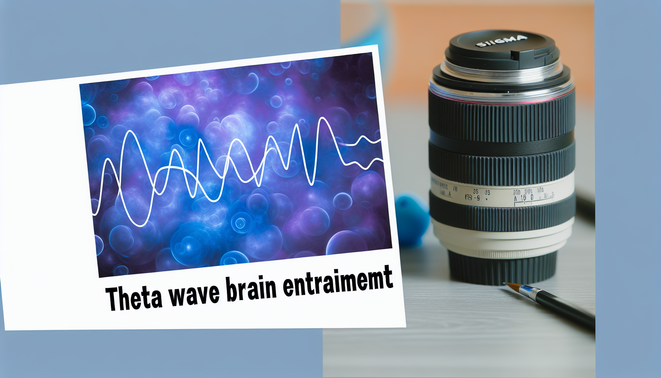“`html
Introduction to Theta Waves
Theta waves are brainwave patterns that oscillate between 4 to 8 Hz, typically associated with deep states of relaxation, meditation, and creativity. When an individual enters a theta state, they often experience enhanced intuition and emotional processing, allowing for profound insights and connections to surface.
The brain produces theta waves during various states, including light sleep and deep meditative states. These waves are essential for restorative practices as they help in shifting the mind away from everyday stresses and distractions. Understanding theta waves is crucial for anyone interested in harnessing their potential for improved mental and emotional well-being [Source: Genius Wave Secrets].
The Science of Brain Entrainment
Brain entrainment is the process of synchronizing one’s brainwave patterns with a repeated stimulus, such as sound, visual cues, or electrostimulation. This technique has gained traction in recent years, particularly concerning theta waves, which can help facilitate deep relaxation and enhanced cognitive function.
Research into brain entrainment indicates that immersing the brain in specific frequencies, such as theta, can lead to significant psychological benefits. The rhythmic patterns of theta waves are especially effective in fostering an environment conducive to learning and creativity [Source: ScienceDirect]. This growing field of study has implications for therapeutic interventions and personal development tactics.
Benefits of Theta Wave Entrainment
Theta wave entrainment offers a variety of benefits that can enhance mental and emotional well-being. First and foremost, theta waves, which occur during deep relaxation and meditative states, have been shown to significantly increase relaxation and reduce stress levels. This state allows individuals to access deeper creative insight and emotional healing, making it a valuable tool for anyone seeking relief from the pressures of modern life [Source: Genius Wave Secrets].
In addition to promoting relaxation, theta wave entrainment can improve focus and concentration. Research has indicated that the rhythmic patterns of theta waves can facilitate cognitive processing, enhancing overall mental clarity and alertness. This increased focus aids in various tasks such as studying, creative work, and problem-solving [Source: Genius Wave Secrets].
Moreover, theta waves have a profound impact on memory retention. The entrainment process can stimulate the brain’s ability to encode and retrieve memories more effectively. Studies have suggested that individuals exposed to theta wave auditory stimulation show improved recall abilities, which can be particularly beneficial for students or professionals looking to enhance their learning capabilities [Source: Genius Wave Secrets].
Methods of Achieving Theta Brain States
To achieve theta brain states, various methods can be employed. These include meditation, breathwork, and the use of specific auditory stimuli like binaural beats. Binaural beats work by presenting two slightly different sound frequencies to each ear, resulting in the brain perceiving a third tone that aligns with theta wave frequencies.
Furthermore, guided imagery and relaxation techniques can effectively promote theta brainwaves, leading to enhanced emotional calm and greater creativity. Engaging in practices like yoga and mindfulness can also support individuals in accessing theta states, enriching their overall cognitive experience [Source: Genius Wave Review].
Future Directions in Theta Wave Research
Future research into theta waves promises exciting advancements, particularly in therapeutic applications for mental health and cognitive enhancement. Significant interest lies in exploring the modulation of theta wave activity to alleviate symptoms associated with anxiety, depression, and PTSD. Studies suggest that theta wave entrainment can promote relaxation and emotional balance, potentially serving as a non-invasive treatment option for these conditions [Source: ScienceDirect].
Moreover, theta waves are increasingly recognized for their role in enhancing cognitive functions such as memory retention and learning. Research examining brainwave entrainment through audio and visual stimulation indicates that increasing theta activity could improve focus and facilitate better information processing [Source: PubMed]. This could lead to innovative educational tools and cognitive training programs designed to harness the power of theta waves [Source: Genius Wave Secrets].
Future investigations may also delve into the neurobiological mechanisms underlying theta wave modulation, aiming to identify optimal conditions for therapeutic applications. As research progresses, the integration of theta wave techniques into traditional therapeutic frameworks could revolutionize the treatment landscape for mental health and cognitive enhancement [Source: Genius Wave Secrets].
Understanding how specific frequencies and entrainment techniques affect theta wave generation will be critical, as will studies examining the long-term effects of theta-centric interventions [Source: Genius Wave Secrets]. These directions in research signify a promising frontier for improving quality of life through cognitive therapies.
Sources
- Genius Wave Secrets – Do Theta Waves Enhance Focus and Memory?
- Genius Wave Secrets – Enhancing Cognition with NASA Research
- Genius Wave Review – Does Theta Audio Boost IQ?
- Genius Wave Secrets – The Truth Behind the Viral Hack
- PubMed – Research on Brainwave Entrainment
- ScienceDirect – Analysis of Theta Waves and Mental Health
“`














